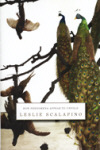How Phenomena Appear to Unfold
Longtime readers of Leslie Scalapino’s poetry and writings will appreciate this expansion of How Phenomena Appear to Unfold, a collection of some of Scalapino’s poetry as well as extensive coverage of her essays and critical writing. Scalapino’s contributions to poetics are extensive, as she explores the methods and theory of the avant-garde, writing on poets such as H.D., Lyn Heijinian, and Philip Whalen. For the poet or poetry lover who wants to further explore or add to their collection of writing concerning the avant-garde, this compilation will provide much context and critical inquiry into poetical debates still relevant today. As Scalapino claims herself in the introduction to the collection, “all of the essays, fictions, poems, and poem-plays, demonstration and examination of each other in a stream of comparisons, are tied to that concept…as also to the notion—a corollary/as the act of incorporating—of the outside and inside simultaneously creating each other.” Each work echoes off of the other, further creating that effect with each read.
Longtime readers of Leslie Scalapino’s poetry and writings will appreciate this expansion of How Phenomena Appear to Unfold, a collection of some of Scalapino’s poetry as well as extensive coverage of her essays and critical writing. Scalapino’s contributions to poetics are extensive, as she explores the methods and theory of the avant-garde, writing on poets such as H.D., Lyn Heijinian, and Philip Whalen. For the poet or poetry lover who wants to further explore or add to their collection of writing concerning the avant-garde, this compilation will provide much context and critical inquiry into poetical debates still relevant today. As Scalapino claims herself in the introduction to the collection, “all of the essays, fictions, poems, and poem-plays, demonstration and examination of each other in a stream of comparisons, are tied to that concept…as also to the notion—a corollary/as the act of incorporating—of the outside and inside simultaneously creating each other.” Each work echoes off of the other, further creating that effect with each read.
While comprehensive, this collection focuses primarily on Scalapino’s critical work, expanding upon the 1989 first edition yet seamlessly woven into the preexisting essays. From the previous edition, the title essay “How Phenomena Appear to Unfold” clearly grounds the individual pieces in the collection, as it explores the idea of phenomena and simultaneity all the while it asks the important question of “how is it that the viewer sees the impression of history created, created by oneself though it’s occurring outside?” Alongside these original essays, this updated second edition places this book into an even more relevant context, discussing such issues as the U.S. foreign conflicts in Iraq and Afghanistan. For example, “Writing Being/An Event” describes and explains Scalapino’s process of writing in reaction to American military aggression. She explains that “the gesture of the writing is its necessity: the gesture (and the necessity) being to find out ‘what’s real’ while at the same time ‘what’s real’ dictates what the gesture is to be.”
Interspersed between these critical endeavors are some of Scalapino’s poetical works, which bring a real sense of energy to the page. For example, Scalapino’s three-part poetic play, “Fin de Siècle,” with the first section performed by two men in stanzaic form:
we haven’t changed any
from the time of Genghis Khan
we have fin de siècle
weariness
no, struggle again to
turn insect jeweled flying
not it
they’re in the corporation
—that are mute
These poems work to inform the critical apparatus of the book, since Scalapino often takes the time to explain her creative work from a critical standpoint, helping to add context to work that may be unfamiliar to the casual reader of poetry.
Scalapino asks difficult questions about the role and purpose of poetics, starting and entering conversations. Those unfamiliar with the avant-garde will find her words informative and engaging, and those already experienced with her work can continue to delve into these writings and discover new revelations.





